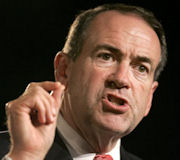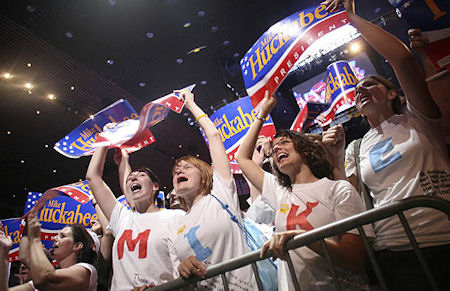Posted February 19, 2008
Mike Huckabee is not going to be the Republican presidential nominee. Though he’s still in the race, Republican insiders have started endorsing John McCain by the droves. This includes many Republican leaders who don’t like McCain much (criticizing his “liberal” stances on immigration, tax cuts, and campaign finance), and some who have a lot of affinities with Huckabee’s base, such as Oliver North. Pundits who have been very critical of McCain, such as Rush Limbaugh, have been asked to tone it down in the name of party unity.

Don’t be surprised to see more of Mike Huckabee, though – perhaps even as a vice presidential nominee. This would make sense for McCain for a number of reasons: Huckabee is young and telegenic, and he appeals to many voters who describes themselves as “very conservative,” especially Christian evangelicals and social conservatives more generally. There’s been a lot of worry in Republican circles about McCain losing the Republican base, not to them voting for someone else but due to apathy and disengagement. Huckabee could probably rev some of those voters up as a vice-presidential nominee; plus, he does well in Southern and Midwestern states which McCain will need to win the race. Huckabee and McCain (unlike McCain and Romney) have kept things very civil, so don’t discount the possibility.
Even if Huckabee doesn’t make the national ticket, we should expect to see more of him. At a moment when evangelical voters were being written off as a force in the Republican primaries, he emerged from the back of the pack on the basis of enthusiasm from the base and few to no endorsements even from the older generation of evangelical leaders. So this might be a good moment to step back and analyze what the Huckabee phenomenon is all about.
The response to Huckabee on the left has been defensive and at times classist, in a way that reinforces to me our utter inability to understand or engage with working-class social conservatives. Lurid images of Huckabee and his supporters as squirrel-shooting, Bible-thumping, pro-slavery rednecks predominate. When looking for my own musings on Huckabee, a search for “Huckabee” in my gmail account yielded a recent mailing from a major anti-war group suggesting that he had a fetish for anal rape. This kind of stuff is just par for the course. I suspect that some on the left enjoy using Christian convervatives as scapegoats in the strict sense – by inflicting verbal abuses onto them, leftists can make common cause with liberals and feel not so weird themselves, sharing a common sense of horror at these grotesque reactionary monsters who are ruining “our country.”
I suggest that we at least momentarily disinvest from some of these commitments in order to understand the phenomenon better. Huckabee is the candidate who best embodies the theses of Thomas Frank’s What’s the Matter with Kansas, a book which grapples with the growth of working-class and “lower-middle-class” (whatever that means, as we’ll discuss another time) support for social conservatism and Republican candidates, to the evident detriment of their class interests. (In my opinion Frank gives too much credit to the Democratic Party as a representative of “better” class policies, and his sense of what the left should do is muddled and perhaps self-contradictory. Nevertheless, read the book, not for the strategy but for his cool-headed, well-researched, anecdotally rich analysis of conservatism.) Perhaps fittingly, on Super Tuesday, when John McCain was establishing himself as the eventual nominee over a challenge from Mitt Romney (who tried hard to out-conservative him), Huckabee won the Kansas Republican caucus by 35% over McCain. Ron Paul came in third, with Romney a miserable fourth.
The interesting thing about Huckabee in particular is the extent to which he ended up campaigning on a mix of social paleo-conservatism and extremely inconsistent economic populism, without a large dose of the pointed race-baiting and ideological purism of, say, Buchanan, which was reminiscent of fascism. When his campaign seemed to have legs, for a moment, Huckabee was pushed in the direction of the economic populism because he thought it would play well in economically depressed parts of Iowa. In Iowa, his support seems to have included independents; since then, in many Republican-only contests, Huckabee has been pushed back onto his evangelical base, and we’ve heard a bit less of the economic populism. Nonetheless, at its full furl, it was quite something to hear a Republican presidential hopeful pull out the following bit of class identity politics: "I believe most Americans want their next president to remind them of the guy they work with, not the guy who laid them off." Incidentally, it’s hard to imagine any of the Democratic candidates this year (or really any time in the last ten years) having the credibility to pull off a line like that.

It seems quite possible to me that we will see the emergence in the next few years of an evangelical Christian political scene which 1) will continue to have extraordinarily reactionary gender / family and freedom of expression politics (and I hope nothing I’ve written in this post suggests that we should minimize that or overlook it), 2) will be no more racist than the political center of white politics in the US (which is to say, still reliant on white supremacy as is true across the white political spectrum, but manifestly against racism, anti-fascist, and for the creation of ideologically middle-class "diverse" communities), and 3) will advocate an inconsistent economic populism, running the gamut from immediately appealing tax cut measures which are redistributive in the direction of business and the rich to anti-corporate politics (rural right-wingers hate Wal Mart as least as much as trade unionists do), some quasi-governmental philanthropy and community development programs, and an emotional appeal to the little guy. It is class identity politics without a class program, to be sure. Nevertheless, if the left wants to have something to say in the national political context, at least we should strive to understand these developments and why they are taking a certain formation.
At best, we should have something to say to these people other than classist insults which identify ourselves, mostly, as products of a middle-class education with its own class biases. We should develop arguments and a program for what the left has to say about their legitimate class grievances, and we should figure out how to have tough conversations with working-class white people about race and about gender / family politics. I would be much more interested in being a part of a left that was grappling with those issues than one which sees itself as liberalism’s left (and very expendable) appendage.
